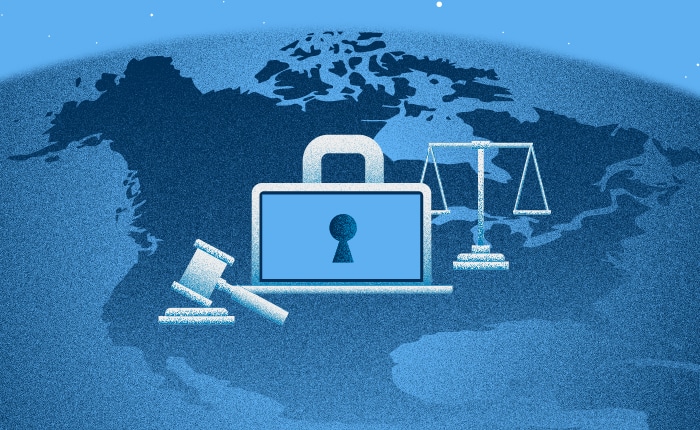What is the importance of data privacy? If you grew up in the internet age, you’re probably familiar with the many ways data is used, from targeting ads to improving customer service and beyond. Yet because consumers and businesses conduct so many vital procedures online, the risk for data loss and confidentiality breaches is higher than ever before.
In this guide, we’ll break down why you should care about data privacy rights, the importance of existing data privacy regulation, and the basics of compliance.
Whether your startup wants to maintain data integrity or your long-standing business just began a transition to paperless processes, this guide will help you operate with data privacy in mind.
Why Are Data Privacy Laws Important?
Data privacy laws are designed to protect vulnerable populations, prevent crime, and assure consistent digital functionality. Let’s explore these three critical functions of data privacy laws in more detail.
They Protect the Vulnerable
The worldwide population contains plenty of people who are less than tech-savvy—and, if you don’t know that your digital information could be weaponized or misused, how will you know that you need to protect yourself against a data breach in the first place?
Data privacy laws protect the vulnerable—people and businesses likely to expose their own information because they don’t know about or understand data privacy compliance concerns. Each data protection law attempts to reach this benchmark in three major ways:
- They attempt to prevent individuals and companies from revealing or providing access to sensitive data by prohibiting certain types of data collection.
- They restrict companies’ ability to share information that they legally collect from consumers for transactional or informational purposes.
- They penalize wrongdoers in an effort to provide justice to victims of data misuse and discourage other parties from participating in data theft.
Data security law protects people and companies from bringing undue harm to themselves or others, even if they don’t understand the potential for disastrous consequences.
They Prevent Theft and Hold Companies Accountable
Laws governing data privacy prevent data breaches and hold companies responsible for data misuse by legislating how companies collect confidential information, where they can share and store this data, and how they keep promises advertised in their Privacy Policies (to which consumers must agree before conducting online transactions).
Let’s explore two examples:
- The Gramm-Leach-Bliley Act (GLBA) requires that consumer financial services providers—like banks, lenders, or investment brokers—disclose how they use and share data collected from individuals and give consumers the option to opt out of data collection.As a result, GLBA prevents data theft by giving consumers more control of which personal data they provide to financial institutions, reducing the likelihood that they’ll accidentally provide data that can be widely shared.
- The Federal Trade Commission Act (FTC Act) empowers the FTC to legally pursue companies who violate their own Privacy Policies. Under the FTC Act, businesses that guarantee consumer data privacy must follow through.For instance, the FTC issued a complaint against Zoom in 2020 when the company advertised that it provided 256-bit end-to-end encryption for video chats when, in reality, the company used less robust privacy measures than promised.
Current Data Privacy Laws
What is the data privacy act law landscape like in its current form?
In the US, only three states have enacted comprehensive data privacy laws to protect consumers. Luckily, eight federal data protection laws protect consumers from data misuse nationwide. Let’s explore these laws in more detail.
The Health Insurance Portability and Accountability Act (HIPAA)
Of all US data privacy laws, you’re likely most familiar with HIPAA, a set of regulations that protect patients’ protected health information (PHI). HIPAA regulations apply to medical providers as well as companies that conduct business with them.
The Fair Credit Reporting Act (FCRA)
The Fair Credit Reporting Act (FCRA) protects information contained in your personal or business credit report. It regulates three major data functions:
- How financial information is collected by credit bureaus
- Which data credit bureaus may obtain from consumers and businesses
- Who can view a credit report
The Family Educational Rights and Privacy Act (FERPA)
FERPA stipulates who can request student educational records. It empowers students, their parents, and other schools the right to request and view specific student educational details.
The Gramm-Leach-Bliley Act (GLBA)
GBLA (which we briefly discussed above) requires that financial institutions:
- Explain how they plan to share customers’ volunteered private data
- Provide an opt-out option for consumers and businesses
Note that GLBA doesn’t restrict how financial entities can use data as long as they disclose their usage.
The Electronic Communications Privacy Act (ECPA)
ECPA restricts the government’s ability to wiretap phone calls and other electronic communication signals and sets broad rules for how employers can monitor and view employee correspondence.
However, since ECPA was passed in 1986, it’s become slightly outdated—The Patriot Act redefined many ECPA protections, and the Act doesn’t protect consumers from law enforcement access to:
- Server data
- Cloud storage documents
- Search histories
The Children’s Online Privacy Protection Rule (COPPA)
COPPA limits companies’ collection of data from and concerning children under the age of 13. It provides directives for two major data collection entities:
- Websites or online services directed at users under 13 years of age
- Online entities that know they are collecting information from someone under 13
The Video Privacy Protection Act (VPPA)
VPPA protects consumers’ VHS rental records. While the law is certainly outdated now, consumers and businesses should expect updated legislation since VPPA doesn’t currently protect consumers’ video streaming activity.
The Federal Trade Commission Act (FTC Act)
The FTC Act (which we explored briefly above) allows the FTC to legally pursue companies that don’t uphold their published Privacy Policies.
International Data Privacy Laws
If your business targets consumers in the EU, Brazil, or other countries with more stringent data privacy laws, you’ll need to comply—even if your business is located in the United States.
Protecting Your Business’s Data
What is the importance of data privacy? On a personal level, you should care about who has access to your information, why they have it, and where they store it.
From a business standpoint, protecting data privacy should be part and parcel of an effective standard operating procedure (SOP). This ensures compliance with data privacy laws, builds trust with your customers, and helps protect your company from potential breaches.
General Confidentiality
You can intuit the importance of data privacy law by considering a general desire for confidentiality. Your customers and stakeholders want to know that you’re protecting information like:
- Online banking, accounting software, and payroll service login information
- The access codes for your facility’s security system
- Your patented designs and company secrets
- Employee personal information
- Data contained in emails and other communication networks (e.g., Slack messages)
However, confidentiality concerns don’t stop there, especially for businesses operating in sectors where security is paramount. Data privacy laws can help protect other, more specific confidential information like:
- Employee salaries
- Secure documents like non-disclosure agreements (NDAs) and employment contracts
- Employee performance data
- Meeting minutes and other need-to-know information
The Impact of Data Accessibility
Unauthorized access to your company’s private data can lead to drastic, long-lasting impacts. Let’s explore a few examples:
- An employee partially paid on commission discovers an unprotected document listing another employee’s sales leads. Access to such a document could give them an unfair advantage and allow them to directly harm the other employee’s sales performance.
- A competing business hacks into your company email server and finds salary and benefits negotiation information for a prospective employee. The competitor could use this information to build a better employment offer, which could interfere with your talent search.
- A hacker accesses your company’s employee database, uncovering significant personal data—including the routing and accounting numbers stored for direct deposit purposes. The criminal could use this information to steal your employees’ identities.
Financial Information Breaches
Financial data breaches can be some of the most devastating security failures. With access to your company’s (or employees’) private financial information, Employer ID Number (EIN), or employee Social Security Numbers (SSNs), ne’er do wells can take control of your financial accounts. With this access, they could:
- Divert your funds to their accounts
- Complete online transactions
- Apply for and take out loans or credit cards in your name
- Withdraw funds from your investment accounts
- Accumulate debt
- Sabotage your cash flow
The importance of data privacy law is demonstrated by the potentially catastrophic impacts of financial data breaches alone.
How to Comply With Data Privacy Laws
It’s crucial that your company works within the law to protect company, employee, and customer data. Your company should take the following steps in their protection efforts:
- Research – Research which data privacy laws apply to your company and how you can work within consumer protection laws to shield your business, your customers, and your employees.
- Create a standard operating procedure (SOP) – While your company may have published SOPs for operational, financial, or sales tasks, you should build a policy related to data privacy.
- Consider infrastructure solutions – You may not have the budget to employ or train an entire privacy protection department. However, you can use a data privacy platform to monitor your company’s data and bolster your security efforts.
- Consult with experts – Enlist a data privacy expert to help you research and understand applicable laws, build a thorough SOP, and consult on possible data protection solutions.
DataGrail: Data Privacy for the Modern Business
From CCPA vs CPRA to GDPR, data privacy laws change quickly, so it’s crucial that your business stays up to date-–after all, protecting the data privacy of your business, your employees, and your customers should be a paramount concern for your brand.
At DataGrail, we know that not everyone is a data security expert—that’s why we help businesses large and small navigate the data privacy landscape, find solutions to their vulnerabilities, and monitor the effectiveness of their privacy efforts. Asking yourself, “what is GDPR data mapping?” We’ve got you covered!
Our all-in-one data privacy platform integrates with numerous apps (like Salesforce, Slack, and countless others) to protect one of your company’s most vital assets—its data.
If you’re ready to develop a robust, effective data privacy solution for your business, request a demo of our platform and take the first step toward protection and compliance.
Sources:
The New York Times. The State of Consumer Data Privacy Laws in the US (And Why It Matters). https://www.nytimes.com/wirecutter/blog/state-of-privacy-laws-in-us/
University of California at Berkeley. Why Should We Care About Online Privacy? https://security.berkeley.edu/news/why-should-we-care-about-online-privacy
US Federal Trade Commission. FTC Requires Zoom to Enhance its Security Practices as Part of Settlement. https://www.ftc.gov/news-events/press-releases/2020/11/ftc-requires-zoom-enhance-its-security-practices-part-settlement
Centers for Disease Control and Prevention. Health Insurance Portability and Accountability Act of 1996 (HIPAA). https://www.cdc.gov/phlp/publications/topic/hipaa.html
US Federal Trade Commission. Children’s Online Privacy Protection Rule (“COPPA”). https://www.ftc.gov/legal-library/browse/rules/childrens-online-privacy-protection-rule-coppa

